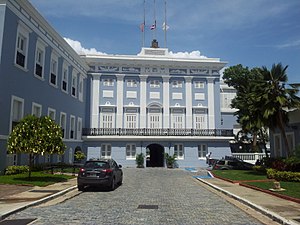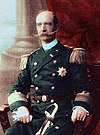Portal:Politics
| Main | Topics and categories | Tasks and projects |
The Politics portal
Politics (from Ancient Greek πολιτικά (politiká) 'affairs of the cities') is the set of activities that are associated with making decisions in groups, or other forms of power relations among individuals, such as the distribution of resources or status. The branch of social science that studies politics and government is referred to as political science.
It may be used positively in the context of a "political solution" which is compromising and non-violent, or descriptively as "the art or science of government", but also often carries a negative connotation. The concept has been defined in various ways, and different approaches have fundamentally differing views on whether it should be used extensively or in a limited way, empirically or normatively, and on whether conflict or co-operation is more essential to it.
A variety of methods are deployed in politics, which include promoting one's own political views among people, negotiation with other political subjects, making laws, and exercising internal and external force, including warfare against adversaries. Politics is exercised on a wide range of social levels, from clans and tribes of traditional societies, through modern local governments, companies and institutions up to sovereign states, to the international level.
In modern nation states, people often form political parties to represent their ideas. Members of a party often agree to take the same position on many issues and agree to support the same changes to law and the same leaders. An election is usually a competition between different parties.
A political system is a framework which defines acceptable political methods within a society. The history of political thought can be traced back to early antiquity, with seminal works such as Plato's Republic, Aristotle's Politics, Confucius's political manuscripts and Chanakya's Arthashastra. (Full article...)
Selected article
The Communist Party of China (CPC) is the founding and ruling political party of the People's Republic of China (PRC). The CPC is the sole governing party of China, although it coexists alongside eight other legal parties that comprise the United Front. It was founded in 1921, chiefly by Chen Duxiu and Li Dazhao. The party grew quickly, and by 1949 the CPC had driven the Kuomintang (KMT) government from mainland China after a 10-year civil war, thus leading to the establishment of the People's Republic of China. The CPC is currently the world's second largest political party with a membership of 87.79 million as of 2015. The current General Secretary (party leader) is Xi Jinping, elected at the 18th National Congress (held in 2012).
Featured picture

Aletta Jacobs (1854–1929) was a Dutch physician and women's suffrage activist. Jacobs strove throughout her life to change laws that limited women's access to equality, starting in 1883 with an unsuccessful court challenge and eventually achieving success on 18 September 1919, with the signing of a suffrage bill into law. In addition to her suffrage work she led campaigns aimed at deregulating prostitution, improving women's working conditions, and promoting peace.
Selected quote
Selected biography
George I of Greece was King of Greece from 1863 to 1913. Originally a Danish prince, when only 17 years old he was elected King by the Greek National Assembly, which had deposed the former King Otto. His nomination was suggested and supported by the three Great Powers (United Kingdom of Great Britain and Ireland, Second French Empire and the Russian Empire). As the first monarch of the new Greek dynasty, his 50-year reign (the longest in modern Greek history) was characterized by territorial gains as Greece established its place in pre-World War I Europe. Two weeks short of the fiftieth anniversary of his accession, and during the First Balkan War, he was assassinated. In sharp contrast to his reign, the reigns of his successors would prove short and insecure.
Did you know (auto-generated) -

- ... that at one point in its political history, the Philippines was represented in the Spanish Cortes Generales?
- ... that the First Lady Bake-Off was inspired by a political gaffe by Hillary Clinton and predicted five out of seven elections?
- ... that the only purpose of the Delaware Straight-Out Truth Teller was to promote a political candidate?
- ... that an excavation for 75 Wall Street revealed an old crock linked with a leader of the Tammany Hall political machine?
- ... that Liz Shore's nomination to be Chief Medical Officer of the United Kingdom was vetoed by Margaret Thatcher because of Shore's husband's political affiliation?
- ... that Ken Russell went on international yo-yo tours before turning to politics?
More did you know...
- ...that the traditional form of government in Tibet from 1642 to 1951 was the Cho-sid-nyi?
- ...that Matt Taibbi's book Griftopia has been described as a "necessary ... corrective" to the assertion that bubbles are an inevitable part of the market economy?
- ...that in the book Net.wars, author Wendy M. Grossman attributes Internet conflict in the 1990s to culture shock from an influx of users?
- ...that former California Assembly Republican Leader and California Republican Party Chair Robert W. Naylor was editor of The Stanford Daily while he was a student at Stanford University?
- ...that although U.S. President Barack Obama is Christian, high-ranked al-Qaida member Ayman al-Zawahiri has falsely claimed that Obama secretly "pray[s] the prayers of the Jews"?
- ...that tiao-kuai is the quasi-federal administration system in China?
In this month
- May 5, 2005 – A General Election in the United Kingdom sees Tony Blair's Labour government returned to office with a reduced majority of 66.
- May 14, 1948 – The Declaration of Independence of Israel is made.
- May 18, 1948 – The first Legislative Yuan of the Republic of China officially convenes in Nanking.
News and Current events
- August 11: 4 local government areas in New South Wales, Australia locked down after COVID-19 case
- August 11: Australia: AstraZeneca vaccine access expanded by Victorian government
- August 1: Australia: Victorian lockdown lifted
- July 29: Tunisia's president dismisses prime minister, suspends parliament
- July 25: Australia: Wikinews interviews Reg Kidd, mayor of the City of Orange, about COVID-19 lockdown and local government
- July 23: South Australia enters week-long lockdown to contain COVID-19 Delta variant spread
- July 21: Technological University Dublin senior lecturer Dr Lorcan Sirr speaks to Wikinews on housing market in Ireland
- July 21: Three rural councils in New South Wales, Australia enter 7-day lockdown
- July 21: Australia: Victoria lockdown extended by a week with 85 active cases recorded
- July 15: California governor signs new state budget, eligible Californians to get stimulus payments
Topics and categories
General images
Related portals
Associated Wikimedia
The following Wikimedia Foundation sister projects provide more on this subject:
-
Commons
Free media repository -
Wikibooks
Free textbooks and manuals -
Wikidata
Free knowledge base -
Wikinews
Free-content news -
Wikiquote
Collection of quotations -
Wikisource
Free-content library -
Wikiversity
Free learning tools -
Wiktionary
Dictionary and thesaurus



























































